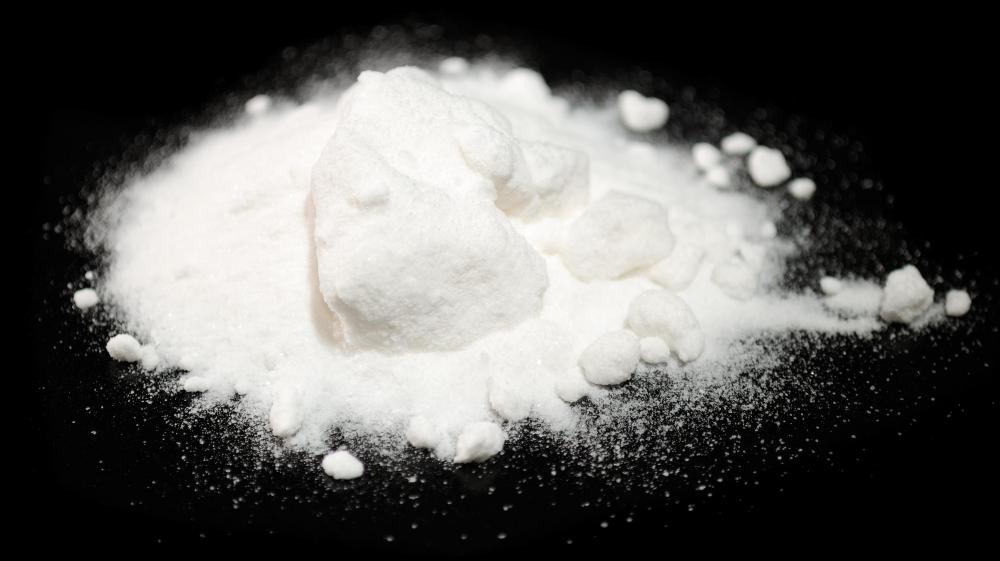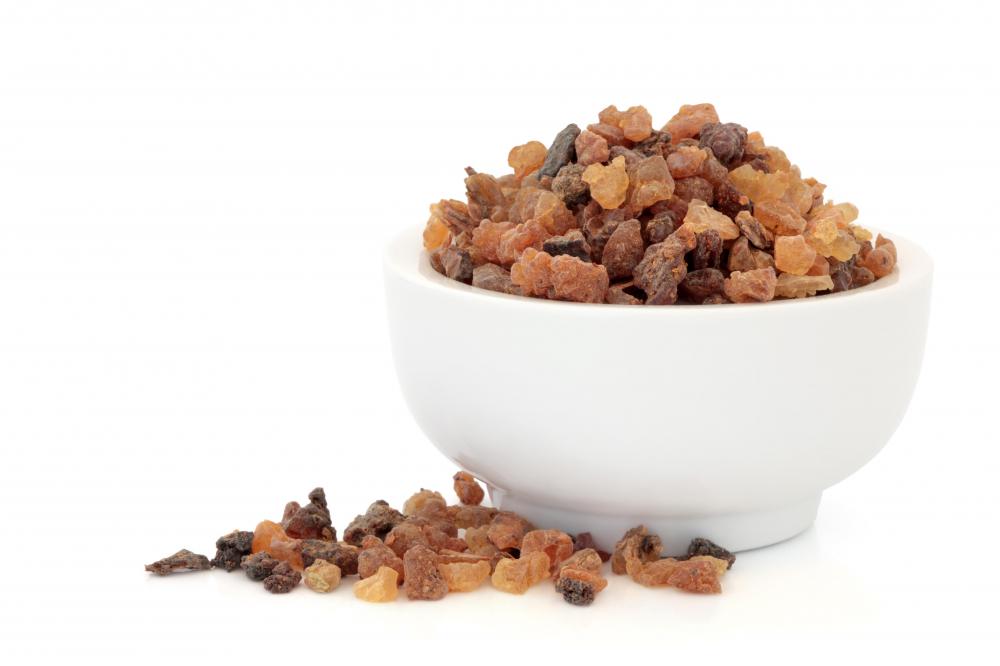At BeautyAnswered, we're committed to delivering accurate, trustworthy information. Our expert-authored content is rigorously fact-checked and sourced from credible authorities. Discover how we uphold the highest standards in providing you with reliable knowledge.
What is Myrrh Toothpaste?
Myrrh toothpaste is toothpaste that includes the resin, or sap, of the myrrh plant. Myrrh is a popular herbal supplement and is considered beneficial for use as a toothpaste ingredient because of its anti-microbial, anti-viral, astringent and antiseptic qualities. Myrrh toothpaste is commercially produced, is frequently combined with baking soda and other herbal ingredients such as propolis, and can often be found as fluoride-free toothpaste. Some also choose to make their own myrrh toothpaste and mouthwash at home.
Myrrh is perhaps most popularly known for its use as an incense or perfume, especially during the Christmas season, yet myrrh has also been used through history as an herbal remedy. It is still used today as an alternative medicine and may be consumed as a supplement or used as a topical ointment. It is known to aid in digestion and to promote the general health of the digestive system, so it is recommended for those with stomach problems. An astringent with antimicrobial properties, myrrh has historically been used on wounds and irritated skin to promote healing and ward off infection. Myrrh is known to support good circulation and, therefore, helps to fight infection and increase the rate of healing; it also boosts the immune system.

Myrrh is put into toothpaste and mouthwash because of its medicinal qualities. Myrrh toothpaste is known to soothe irritated areas of the gums, mouth and throat, and to promote quick healing of cuts and ulcers. Taken either externally or internally, it is also thought to promote healthy gums and strong teeth. Its microbial and antiseptic qualities make myrrh an effective remedy for bad breath and gingivitis.

Homemade myrrh toothpaste uses a small amount of myrrh tincture mixed with a number of other ingredients. There are numerous recipes available for homemade myrrh toothpaste, but common ingredients include bicarbonate of soda, salt, essential oils, and vegetable glycerin. Toothpaste with myrrh is also available commercially, often from health food stores or organic companies that advertise it as an alternative to fluoride toothpastes.
It should be noted that myrrh can be toxic if used in excess and it is especially important that pregnant women not take myrrh internally. If making homemade myrrh toothpaste or mouthwash, recommended amounts listed in recipes should not be exceeded. The amount of myrrh in commercially sold toothpastes should not be a concern as long as the product is used as directed, because the amount of myrrh in these products is carefully measured.
AS FEATURED ON:
AS FEATURED ON:












Discussion Comments
The only problem with most regular toothpastes is that most of them contain sugar to "sweeten" the taste, but sugar, as most know, is not the best for your teeth. I started using Weleda Salt toothpaste and love it! The taste is different, but not too hard to get used to, and it leaves my mouth minty fresh, my teeth squeaky clean, and the salt helps increase saliva which is good for your gums.
My sister sells health products and she encouraged me to try their natural toothpaste. I don't remember everything that was in it, but do remember it contained myrrh.
She gave me a tube to try and I am glad I didn't spend any money on it. I just couldn't get used to the taste of it. It tasted almost bitter to me, and I missed the minty freshness I was used to.
I understand the benefits of using essential oils such as myrrh, but wasn't able to tolerate it in the toothpaste. I have used essential oils in other products and liked the results, but wasn't able to handle the toothpaste.
I didn't want to waste the toothpaste, so I gave it back to my sister who uses it every day and loves it.
I tried making my own toothpaste once, but didn't think it was worth the time. A tube of toothpaste isn't that expensive and lasts quite awhile, so I haven't made it since.
The toothpaste I use now has myrrh, propolis and fennel in it. It uses xylitol as a natural sweetener and doesn't contain any fluoride.
I also use a mouthwash that contains myrrh. My dentist always comments on how good my teeth are and I have no signs of gingivitis.
I use pure essential oils for many remedies and beauty products. Using myrrh oil in my toothpaste is just another way to incorporate essential oils in the products I use every day.
@hamje32 - I didn’t know that the homemade recipe for myrrh toothpaste called for baking soda in addition to the myrrh. That’s quite shocking actually.
I happen to think that baking soda is quite abrasive. Certainly it has a good reputation for being a good cleaning agent for your teeth, but if you are making myrrh toothpaste specifically to fight gum disease, I wouldn’t recommend that you use the baking soda.
I don’t know what you would use to replace it but it would have to be something soft like a gel or something like that.
I have a gingivitis condition and so use several brands of toothpaste especially formulated for sensitive gums.
One of these is made of myrrh and another contains various essential oils. They have all been very helpful in cleaning my teeth without too much abrasion. The problem with regular toothpaste is that it contains sudsy foam that is especially abrasive and irritating to your teeth and gums.
If you have regular teeth you can probably get by okay on it, but if you have gingivitis or some other mouth condition, these toothpastes actually worsen your oral health rather than improve it. The herbal toothpastes are a big improvement in that regard.
For years I have used a natural toothpaste that has myrrh organic essential oil in it. I joined a health company many years ago and quit using my regular toothpaste.
Many brands of toothpaste have a lot of sugar in them, and I was looking for something that used a natural sweetener.
It did take awhile to get used to the taste and texture of this toothpaste, but now I wouldn't want to use anything else. If I am traveling and have to use 'regular' toothpaste, it is too sweet.
My gums have also been healthier since I started using this toothpaste on a regular basis.
Post your comments